governance
- Corporate governance system
- Risk management
- Share capital and securities
- Shareholder and investor relations

- Articles of Association
- Code of Business Conduct and Ethics
- Code of Conduct for Prevention of Insider Trading
- Regulation on the Board of Directors
- Regulation on the Audit Committee of the Board of Directors

are available on the Company’s website
- basic rules, principles, and values of the Company and its employees
- standards of business and social conduct
- ethical standards for internal and external corporate relations
- principles of social responsibility towards employees, shareholders, business partners, the state,
and society
The Code is modelled on generally accepted standards of corporate ethics and business conduct, international laws, and documents that define best corporate governance practice. It is a valuable tool for creating a strong corporate culture and a well-defined system of corporate values that in turn determine and shape the Company’s reputation, competitive edge, and effectiveness.
The Code applies to all companies within the Rusagro Group. Its provisions cover, and apply to, members of the Board of Directors, senior executives, and all other employees of the Company.

is available on the Company’s website



The governance of compliance matters is structured through the Company’s Internal Audit Service (the “Service”). In accordance with the provisions of the Code of Business Conduct and Ethics regarding adherence to and compliance with the law, the Service surveys employees to identify possible violations. Compliance officers handle any complaints and decide how to respond. After the appropriate checks have been carried out, the results are discussed with management and reports are drawn up for the Audit Committee. Another of the Service’s duties is to monitor the implementation of measures that have been developed and approved to ensure compliance in the course of the Company’s operations.
If a violation of the law is identified, the authorised official must inform the appropriate Company bodies. If the accuracy of the information is confirmed, suggesting a criminal or administrative violation has been committed, this information is passed on to law enforcement authorities. If a violation of the Code is not related to applicable law, the following measures may be applied to the employee at fault: removal of bonus or other incentives, denial of promotion, or public reprimand. If appropriate legal grounds are identified, disciplinary action may also be considered.
The key document regulating anti-corruption measures within the Company is the Anti-corruption Policy approved in 2019. Abiding by the principles and requirements of this Policy is mandatory for all employees in equal measure, as is abiding by the requirements of the applicable anti-corruption legislation and regulatory acts of the Russian Federation. These provisions also apply to counterparties and other parties that may act on the Company’s behalf.
The key principles of Rusagro’s anti-corruption measures are:
- rejection of corruption in all its forms and manifestations
- the personal example set by senior Company executives
- employee engagement
- anti-corruption mechanisms that are systematic, risk-proportionate, and effective
- responsibility and the inevitability of punishment
- business transparency
- due diligence
- continuous oversight and regular monitoring
- alignment of the Company’s Anti-corruption Policy with applicable law and generally accepted standards
In addition to complying with the Anti-corruption Policy, all employees must abide by international anti-corruption acts.
These include:
- romantic or sexual relationships between managers and their subordinates
- family relationships (close or distant) with another employee of the Company or the employee of a client, supplier, or competitor
- spousal relationships (including former spousal relationships) with another employee of the Company or the employee of a client, supplier, or competitor
- joint participation with another employee in a commercial enterprise or common membership in a religious or other non-profit organisation
In 2011, the Company introduced its Code of Conduct for Prevention of Insider Trading that applies to all Company employees and members of the Board of Directors. On 12 November 2021, it was resolved to amend the Code of Conduct for Prevention of Insider Trading by reducing the time frames for the start of the Annual Blackout Period for Securities Transactions from 60 to 30 calendar days.
The Company employs relevant global best practices to ensure that all securities market participants have equal access to sensitive information in an effort to prevent misuse of insider information — information that could affect the value of the Company’s securities.


In addition to understanding and complying with the Company’s Code of Conduct for Prevention of Insider Trading, employees must abide by international acts on the use and disclosure of insider information.
These include:

The Disclosure and Transparency Rules (DTR) of the UK Financial Services Authority
The UK Criminal Justice Act (1993) and other applicable laws and/or regulatory requirements
- Meeting of Shareholders;
- Board of Directors;
- Audit Committee of the Board of Directors;
- Managing Director.

- to announce the payment of dividends on the Company’s securities
- to decide upon the issue of shares and the Company’s other issuable securities
- to decide upon the acquisition of shares previously issued by the Company
- to approve the Company’s financial (accounting) statements
- to review the reports of the auditors and the Board of Directors
- to approve the Annual Report
- to elect members to the Board of Directors
- to elect an auditor for the Company and determine their remuneration
- to approve any purchase of the Company’s shares by members of the Board of Directors
- to resolve to liquidate the Company
- 2022 audited consolidated financial statements
- 2022 audited separate financial statements
- 2022 independent auditor’s report
- 2022 directors’ report
- 2022 Annual Report
- the auditor for 2023 and their remuneration
- no 2022 year-end dividend payout (except interim dividends already paid out)
- other matters, including the re-election of members of the Board of Directors and their remuneration
The Board of Directors is the Company’s collective governance body and is responsible for overall management of the Company, except for issues that fall under the exclusive authority of the Meeting of Shareholders. The Board of Directors is collectively responsible for the Company’s performance.
The Board determines strategic objectives, provides the financial and human resources needed to achieve these objectives, and assesses the performance of the Company’s management team. The Board of Directors also determines the values and standards of corporate governance and ensures that the Company meets its obligations to shareholders.
In accordance with the Company’s Articles of Association, the Board of Directors shall have at least two and no more than five directors, of which a minimum of two must be independent. The Company is guided by the general principles of cultural and gender diversity on the Board of Directors, which helps Rusagro to ensure effective decision-making.
- Sergey Koltunov
- Mariia Egorova
- Alexey Smagin
- Axana Mansourian (Managing Director)
- to assist the Board in making decisions related to reporting and auditing
- to improve the Board’s oversight of the Company’s financial and economic activities by preparing and reviewing in advance recommendations for the Board on matters within the Board’s purview
- to set up an effective system for oversight of the Company’s financial and economic activities and ensure the Board’s participation in implementing it
- Axana Mansourian
- Mariia Egorova
- Alexey Smagin
Lipatov
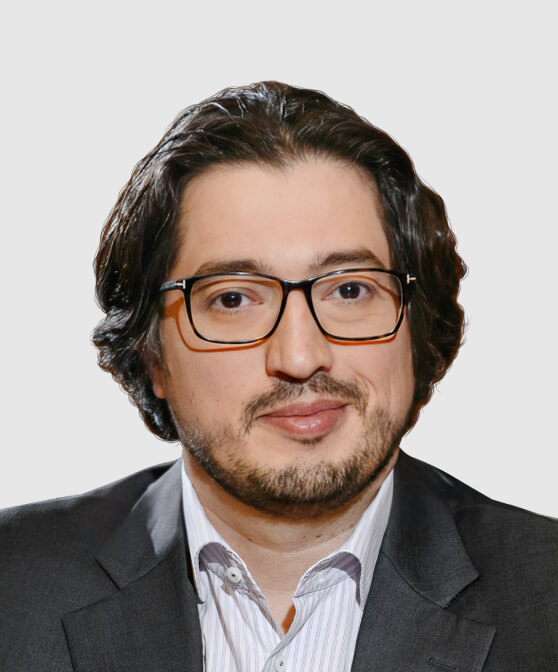
Born in 1980, Timur Lipatov graduated with distinction from the Moscow Power Engineering Institute and the International Independent University of Environmental and Political Sciences, gaining degrees in both Thermal Power Engineering and Management. In 2012, Mr Lipatov earned an MBA from the European School of Management and Technology in Berlin, Germany.
Before joining Rusagro, he headed Silovye Mashiny (Power Machines) from 2018 to 2021. From 2015 to 2018, he was the CEO of Inter RAO — Power Generation Management. Prior to that, he held management positions at companies such as E.ON Russia, OGK-3 and OGK-5, and Tekhnopromeksport.
He was appointed as CEO of Rusagro Group LLC on 1 January 2022.
Tarasov
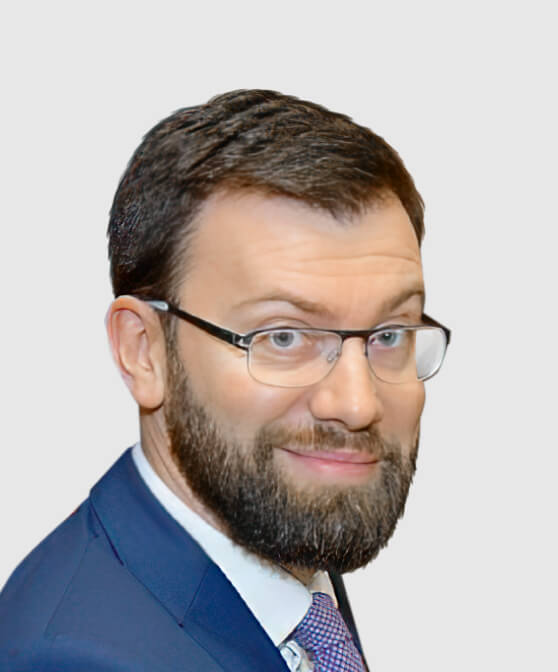
Born in 1977, Alexander Tarasov graduated in Economics from the Higher School of Economics National Research University. In 2013, he earned a diploma from the University of Chicago Booth School of Business.
Before joining Rusagro, Mr Tarasov was Executive Vice President for Finance at Gloria Jeans from 2017 to 2022. He had previously worked in management positions at the ROSTA Pharmaceuticals Group, the X5 Retail Group, and the retail chain Kopeika.
He was appointed as CFO of Rusagro Group LLC on 16 June 2022.
Koltunov
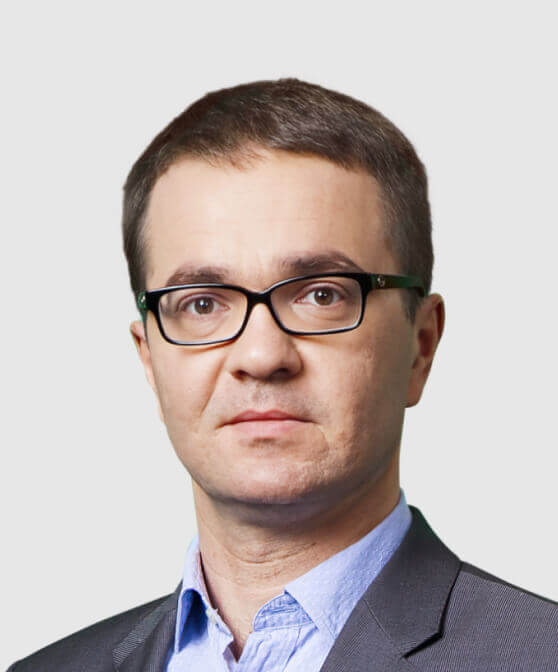
Born in 1980, Sergey Koltunov graduated from the Faculty of Law at Lobachevsky State University of Nizhny Novgorod in 2003. In 2004, he gained a second degree in Economics and Management. In 2011, he completed a management training course at the Russian Presidential Academy of National Economy and Public Administration.
Before joining Rusagro, Mr Koltunov was Head of Legal Affairs and held senior management positions at the Russky Alkogol Group and Danone.
He was appointed as Director of Legal and Corporate Affairs at Rusagro Group LLC in 2013.
He has repeatedly featured in the Top 1,000 Russian Managers ranking drawn up by the Managers Association and Kommersant Publishing House, as well as in The Legal 500 GC Powerlist: Russia.
Sushkova
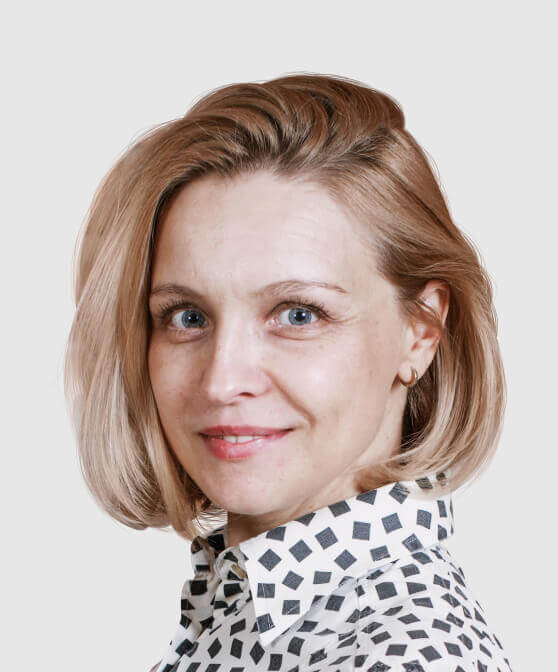
Yulia Sushkova has extensive experience of senior-level HR management at major companies and holding companies in a variety of industries. Before joining Rusagro, she spent nine years working at production companies in the machine-building and aviation industries, including Russkie Mashiny (Russian Machines) JSC.
Ms Sushkova graduated in Engineering Mathematics from the Faculty of Cybernetics at the National Research Nuclear University MEPhI (Moscow Engineering Physics Institute). She is also an IoD Chartered Director, holding the internationally recognised qualification for board directors.
Yulia was appointed to her current position on 20 December 2023.
Kulchitskiy
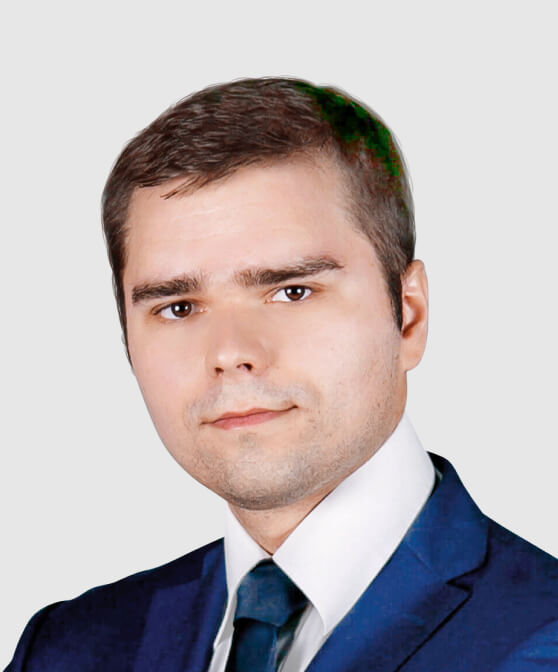
Born in 1990, Alexey Kulchitskiy graduated from Lomonosov Moscow State University, majoring in Economics and Management. In 2014 he earned a Master’s degree in Law from Kutafin Moscow State Law University, and in 2019 he completed the Masters in Finance programme at the New Economic School.
Before joining Rusagro, he worked on mergers and acquisitions at RUSAL, Gazprom Neft, Transmashholding, Rosnano, and Russian Railways.
Mr Kulchitskiy holds the following professional certifications: CAIA (Chartered Alternative Investment Analyst), FRM (Financial Risk Manager), and PMP (Project Management Professional).
He was appointed as Rusagro Group’s M&A, IR and ESG Director in January 2023.
Brekhov
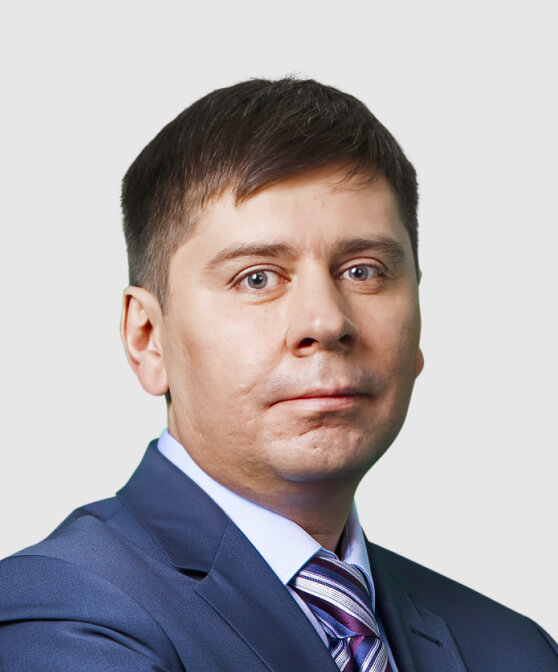
Born in 1971, Dmitry Brekhov graduated in Accountancy and Auditing from the Faculty of Economics of Lomonosov Moscow State University in 1997.
Mr Brekhov previously headed the internal audit team at AGRICO Agricultural Investment Company and Antanta Pioglobal Investment Group.
He holds an ACCA Diploma in International Financial Reporting (DipIFR) and a general audit certificate from the Ministry of Finance of the Russian Federation.
He was appointed as Head of Internal Audit at Rusagro Group LLC in October 2010.
Laburtsev
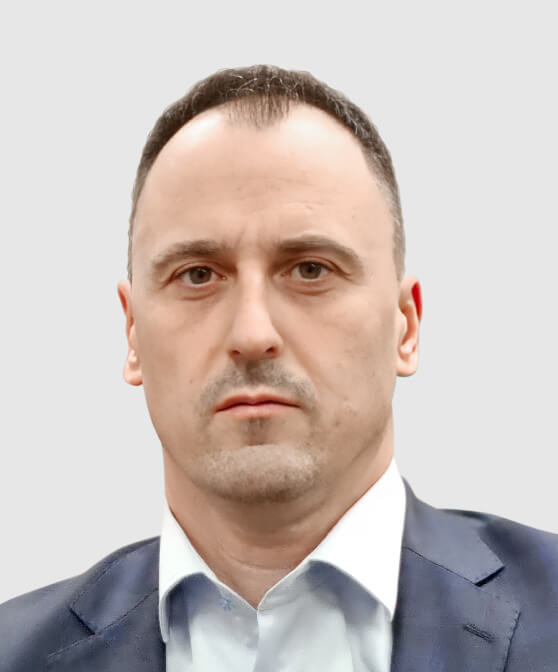
Born in 1977, Dmitry Laburtsev holds a degree in Law from Volgograd Academy of Public Administration and a Master’s degree in Agronomy from Saratov State Agrarian University.
Prior to joining Rusagro, Mr Laburtsev was head of Volgograd Agro-Industrial Company LLC from 2010 to 2017. From 2017 to 2019, he headed the agricultural business at Solnechnye Produkty.
From 2019 to 2020, he was the CEO of Agrotekhnologii LLC. From January to September 2021, he was the Chief Operating Officer of Rusagro’s Agriculture Business, which he has headed since September 2021.
Koroy
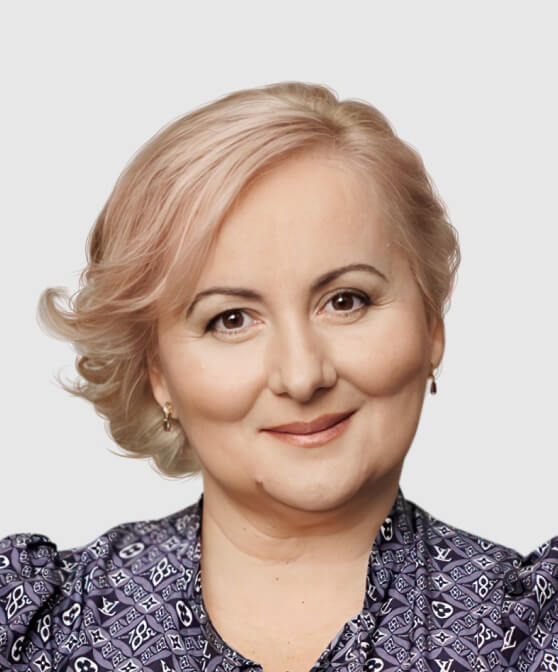
Born in 1975, Natalya Koroy graduated in Psychology from the State Pedagogical University of Chișinău in 1998.
From 2007 to 2019, Ms Koroy held various positions at Solnechnye Produkty. She has been working in Rusagro’s Oil and Fats Business since 2019. She was the Director of the Industrial Fats Division from 2019 to 2021, and Director of the Consumer Products Division from 2021 to 2022.
She has headed Rusagro’s Oil and Fats Business since April 2022.
Altuhov
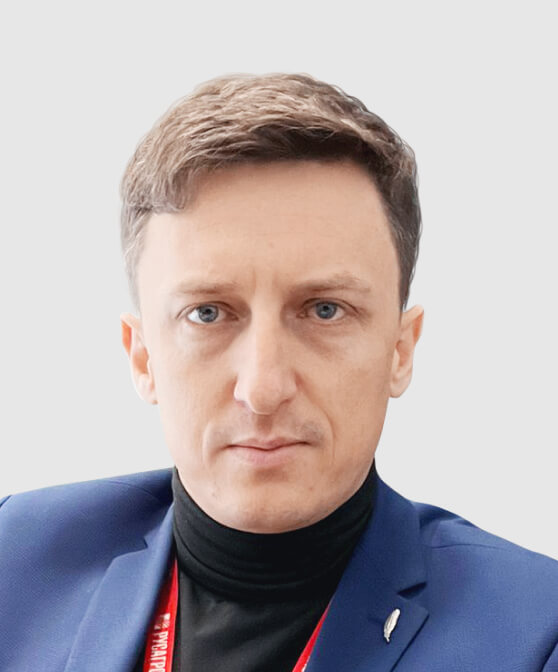
Business
Born in 1987, Alexander Altuhov graduated with distinction from Gorin Belgorod State Agricultural Academy in 2010, earning a dual degree in Agricultural Production, Processing, Certification and Storage Technology, and in Economics and Management, majoring in Economics and Agricultural Management.
He has worked in the food industry, and in the Meat Business, since 2010, including holding management positions at KapitalAgro CJSC. In 2019 he became director of meat processing at the Belgorod branch of Tambov Bacon LLC.
Mr Altuhov has headed Rusagro’s Meat Business since July 2023.
Goryachev
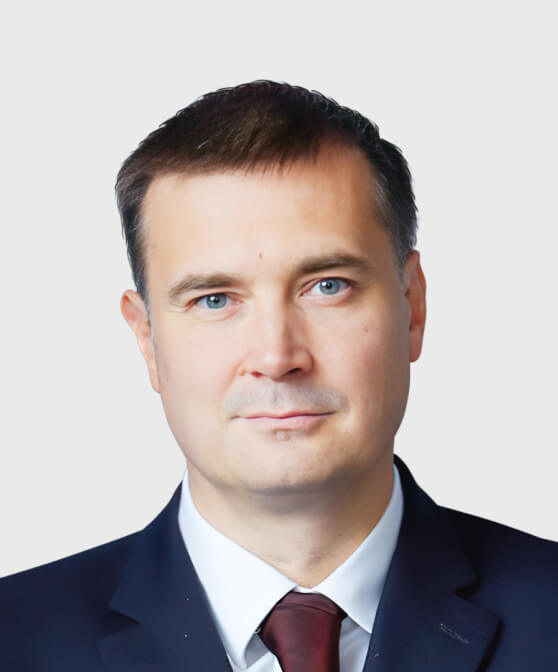
Born in 1974, Sergey Goryachev graduated in Geochemistry from Lomonosov Moscow State University in 1996. In 2002 he received a Master’s degree in Finance from the Russian Government’s Financial Academy. In 2017, he earned an MBA from the University of Chicago Booth School of Business.
From 2002 to 2007, Mr Goryachev worked at the Gross Group, first as Commercial Director and then as Deputy CEO. From 2010 onwards, his career developed at RUSAL. In 2018, he took on the role of Executive Director of RUSAL’s Downstream Division.
He has headed Rusagro’s Sugar Business since April 2022.

staff in 2023

management staff in 2023
MN
(score from 1 to 5)
- The Company monitors any changes in state policy and responds accordingly, promptly adapting Rusagro’s strategy.
- The Company takes a proactive position and, whenever possible, discusses with government officials the introduction of restrictive measures and their impact on the business.
- The Company considers the political situation in the Russian Federation to be stable and expects it to continue to be so, given positive trends in the development of the economy and the political system.
- The Company monitors changes as the situation evolves and responds accordingly, promptly adapting its business strategy.
- The Company’s export portfolio enables it to partially mitigate these risks.
- The Company is taking proactive measures to reduce this risk by expanding its network of international partners and clients and exploring new service providers and suppliers of essential technical hardware both in Russia and abroad.
- Several of the Company’s assets are located in Russia’s Far Eastern Federal District, making direct access to Asian markets easier.
- increase in competitive supply or competition
- erosion of household purchasing power
- slump in global prices
- recession
- Diversification of the Company’s product portfolio by extending product range and developing retail brands with a higher added value.
- Development of sales channels, contracting with major industrial partners and retail chains.
- Development of export sales and expansion into new markets.
- Maintenance of stocks of finished products intended for sale during seasonal price hikes.
- Continuous monitoring of the market situation to obtain a true and fair view of the prevailing trends and to ensure a sound basis for forecasting market developments.
- The fact that products made by some of the Company’s businesses are a cost item for its other businesses has a significant stabilising influence on the Company’s overall financial performance.
- An integrated approach to weather forecasting based on weather station data.
- Regular monitoring of crops.
- Digitalisation of strategic planning and operational processes in the Agriculture Business.
- Automation of the optimal scheduling of sugar beet digging, piling, and delivery, as well as the harvesting and exporting of grains and pulses.
- Automated quality control of handling operations.
- Development of sprinkler and irrigation systems.
- Climate-driven hybrid and varietal seed selection.
Risks associated with potential changes in prices for the main raw materials, goods, work, and services used by the Company in its operations can adversely affect its financial performance.
Changes in prices for the main raw materials, goods, work, and services used by the Company in its operations on the Russian market may lead to fluctuations in prices for the products it produces.
- To level off these risks, the Company enters into long-term contracts, engages in long-term planning, and conducts continuous market analysis.
- Transport and inventory flow monitoring and decontamination.
- Compliance with the most stringent biosecurity requirements. Prevention of physical contact between farm-bred pigs and wild animals.
- Health monitoring of pigs reared at the Company’s production facilities.
- Monitoring of ASF incidents in Russia.
- Pest control by treating plants and seeds with insecticides and fungicides.
- Rapid response headquarters established to develop and monitor the implementation of anti-crisis measures.
- Restrictions on the movement of employees between the Company’s offices and production sites, as well as less travel to other regions and countries.
- Distribution of additional personal protective equipment and antiseptics, as well as additional disinfection measures.
- Comprehensive communication programme to keep employees informed and dedicated hotlines for employees.
- Support for employees to have regular tests and vaccinations.
- Monitoring and improving staff management, including through the development of effective incentive systems.
- Development and enforcement of standards, regulations, and instructions for the implementation of process-related operations.
- Automation and digitalisation of planning processes and management of production activities.
- Development of in-house seed selection.
- Development of in-house R&D in all main areas of the Company’s business.
- Development of in-house IT solutions and robotisation in the agricultural sector.
Agricultural production is subject to natural and manmade risks, including risks inherent in landscape transformation and stemming from pollutant emissions, land degradation, waterlogging, salination, impact on biodiversity, and violations of chemical safety regulations through the misuse of crop protection agents.
Environmental risks are associated with financial loss from fines and the cost of remedying the effects of a violation.
- The Company approaches the agricultural process diligently and with due care regarding the use of fertilisers, the production and storage of raw materials and products, and waste management.
- The Company has R&D departments and has technicians and environmentalists on its staff.
- A number of programmes are being developed in conjunction with regional authorities with the aim of improving the standard of living in the regions where the Company operates.
- Support for specialist institutes of higher education.
- Attracting young professionals to the regions where the Company operates.
- The Company analyses its exposure to interest-related risk on a regular basis. Various scenarios are considered based on refinancing, renewing existing positions, and alternative financing.
- The Company monitors any changes in state policy and responds accordingly, promptly adapting Rusagro’s strategy.
- The Company takes a proactive position and, whenever possible, discusses with government officials the introduction of measures to support the agriculture industry and their impact on the business.
- Currency risks are partially mitigated by export contracts under which payments are made in foreign currency.
- Prudent liquidity risk management involves holding sufficient cash and maintaining sources of financing from a sufficient number of pre-agreed credit resources. Given the dynamic nature of the core business, the Company’s treasury strives to maintain flexibility in financing by ensuring access to pre-agreed credit lines.
- The Company bases its operations on strict compliance with applicable Russian and international law, monitors and responds promptly to changes in legislation, and is committed to constructive dialogue with the authorities regarding law enforcement practice.
The Company faces a reputational risk associated with any negative perception of the Company’s financial stability and financial situation, the quality of its products, or the nature of its operations overall.
Operating in the food product industry involves risks related to the spoilage of products and requirements as to their quality and shelf life. Any aspect of the production, packaging, marketing, and sale of our products may be the subject of complaints from consumers, and negative consequences arising from such complaints being publicised may have an adverse effect on the Company’s reputation.
- The Company’s PR strategy aims to create and maintain a positive image in society and in the media landscape, including both mainstream and social media.
- The Company is actively involved in charitable activities and supports institutions of higher education, schools, and local regional communities.
This type of risk is associated with poor decision-making when determining the Company’s operational and development strategy.
Human errors in operational planning and implementation can have a negative impact on production results and production costs. Agronomic errors are detrimental to the results of the Agriculture and Sugar Businesses, and breaches of operating procedure at processing plants are detrimental to the results of the Meat and Oil and Fats Businesses.
- The Company is actively diversifying production operations and creating effective management structures so that potential errors in decision-making can be kept to a minimum.
- ISIN US7496552057
- LSE — AGRO
- MOEX — AGRO
- AIX — AGRO.Y
- Reuters — AGRORq.L
- Bloomberg — AGRO LI Equity, 3191226Z CY EquityThere are two tickers for Ros Agro PLC securities on the Bloomberg terminal: AGRO LI Equity — for listed shares (8,333,333 shares with 41,666,665 GDRs), and 3191226Z CY Equity — for non-listed shares (19,000,000 shares).
Shareholders’ right to participate in Rusagro’s profits is exercised through the dividend policy. In August 2013, the Meeting of Shareholders approved a dividend policy that provides for annual payments of at least 25% of the Company’s net profit. In 2021, a decision was taken to raise the minimum payment threshold to 50% of the Company’s net profit. Payment is made twice a year based on financial performance during the first six months and second six months of the year. Securities owned by the Company are not part of the dividend payout.
Based on the 2021 full-year results, the Company’s Annual Meeting of Shareholders held on 1 April 2022 approved a resolution not to distribute dividends for the 12 months of 2021, other than the previously paid interim dividends.
Since 2022, no decisions regarding profit distribution have been taken, and dividends have not accrued or been paid. The Board of Directors is making every possible effort to find ways to enable the Company to resume the payment of dividends.
Calculated according to the dollar exchange rate as of the date of the meeting of the Board of Directors at which it was proposed to pay dividends for the period specified. % of net profit








Efficient and effective performance lies at the core of Rusagro’s investment appeal. However, positive investment decisions are also heavily influenced by corporate governance matters, especially the level of openness and transparency regarding the Company’s business.
In its desire to ensure a level of transparency in line with international best practice, the Company communicates to the investment community in a timely manner all information that could have a material effect on the value of the Company’s securities:
- annual and quarterly reporting on financial and operating results
- information on all material events pertaining to the Company’s business
- specialised information and analytical materials for investors
In doing so, Rusagro ensures that all members of the investment community have equal access to information about the Company and takes care to foreclose exclusive access to this information by certain groups of investors. To this end, the Company aims to ensure the timely publication of information in both Russian and English.
Any information that may have an impact on the Company’s share price is posted on the official website of Rusagro Group LLC and the RNS LSE and Interfax portals in accordance with established information disclosure requirements. The 2022 Annual Report is also available through the FCA National Storage Mechanism.
Rusagro is committed to providing its stakeholders with both its financial and non-financial information.

To ensure a uniform interpretation of results and developments at the Company, Rusagro organises regular meetings of the Company’s senior executives and key managers with representatives of the media and the investment community. The Company also maintains ongoing communication via the Internet and telecommunications networks.
As soon as the quarterly and annual financial results are available, the Company’s management holds video calls to share the results and provide any further explanations that are needed to assess the financial standing of the Group. Participants in these calls have the opportunity to put their questions directly to the Company’s senior executives. Presentations are given in Russian with simultaneous interpreting into English. The Company held four such calls in 2023: on 6 March, 22 May, 7 August, and 13 November.

Annual Report in digital format







